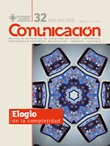The Challenges of Communication in Social Appropriation of Knowledge, in some Significative Experiences of Social Innovation in Medellin
Main Article Content
Abstract
The Society of Knowledge and the globalization have made arise new logics in the social processes of knowledge. One of them is the increasing value of the colaborative constructed knowledge inside development processes and social innovation. This knowledge is assumed even as a part of the cognitive capital and of Relational Capital on most recent economic schemes.
The topic of the social innovation takes prevalence in a country as Colombia, where the social gaps are so diverse as her population and where the needs of social change have been commented from the whiteness of the 20th century. Finding sense to these new logics can allow us to go beyond the classic concepts of social change to generate other alternative perspectives about development. But, which is the role of Social Communication? Which are the challenges of Social Communication in the relation between collective knowledge, Cognitive Capital and social innovation?
This text seeks to present a reflection on the deep relations between communication and social appropriation of knowledge as a key in the consolidation of a share capital, in concrete experiences of social innovation of the Metropolitan area of Medellin, from the first phase of Research project named “Appropriation And Promotion Of The Social Innovation In The Department Of Antioquia”, realized by Catolica del Norte Foundation and Universidad Pontificia Bolivariana.
References
Chartier, R. (1996). El mundo como representación. Historia cultural: entre práctica y representación. Barcelona, Gedisa.
Crovi Druetta, D. (1993) Dimensión social del acceso, uso y apropiación de las TIC, Universidad de Lima, Contratexto Digital. Año 5, N° 6 Recuperado de: http://www.fba.unlp.edu.ar/ tic/archivos/M12.pdf
Cruz Amaya, M. (2012). Auto Organización Comunitaria para la Innovación Social y el Desarrollo Local Caso: Comuna 13, ciudad de Medellín. Tesis para la Maestría en Desarrollo, Escuela de Ciencias Sociales, Universidad Pontificia Bolivariana, Medellín, Colombia.
De Certeau, M. (1980). L’invention du quotidien. Paris: UGE.
Echevarría, J. (2008). Manual de Oslo y la innovación social. Madrid: Arbor Ciencia, Pensamiento y Cultura.
Hopenhayn, M. (2010). Innovación en los sectores sociales. Recuperado de http://www.eclac. cl/noticias/paginas/9/20509/hopenhayn.pdf (consultado el 18 de febrero de 2010)
Jiménez Saez, F. (2005). Conceptos de Innovación. Universidad de Valencia.
Jouët, J. (1993a.) Pratiques de communication et figures de la médiation, Réseaux, 60, 99-120.
Jouët, J. (1993b.) Usages et pratiques des nouveaux outils de communication, dans Dictionnaire critique de la communication, sous la direction de L. Sfez. Paris : PUF.
Lacroix, J. (1994). Entrez dans l’univers merveilleux de Vidéoway, dans De la télématique aux autoroutes électroniques. Le grand projet reconduit, sous la direction de J.-G. Lacroix et G. Tremblay, Sainte-Foy: Presses de l’Université du Québec, Grenoble: Presses Universitaires de Grenoble, 137-162.
Manzini, E. (2005). Distributed systems. Promisin models for a sustainable developed. Milán: Politécnico de Milano.
Manzini, E. (2005). Enabling solutions, social innovation, creative communities and strategic desing. Milán: Politécnico de Milano.
Manzini, E. (2006). Creative communites. Collaborative networks and distributed economies. Promising signales for a sustainnable development. Milán: Politécnico de Milano.
Manzini, E. (2006). Desing, ethics and sustainability. Guidelines for a transitions place. Milán: Politécnico de Milano.
Manzini, E. (2007). Systems capable of evolving. Flexibility in the era networks and sustainability. Milán: Politécnico de Milano.
Manzini, E. (2007). Desingning networks and metadesing. Milán: Politécnico de Milano.
Nagles, N. (2007) La gestión del conocimiento como fuente de innovación. Revista Escuela de Administración de Negocios, (61), pp. 77-87.
Proulx, S. (2005) Penser les usages des TIC aujourd’hui : enjeux, modèles, tendances. In Lise Vieira et Nathalie Pinède, éds, Enjeux et usages des TIC: aspects sociaux et culturels, t. 1, Presses universitaires de Bordeaux, Bordeaux, p. 7-20.
Proulx, S. (1983). Une lecture de l’oeuvre de Michel de Certeau: l’invention du quotidien, Usages des NTIC: les approches de la diffusion, de l’innovation et de l’a... http:// commposite.org/v1/98.1/articles/ntic_1.htm19 of 19 2008-05-28 15:15 paradigme de l’activité des usagers, Communication, 15 (2), pp.171-197.
Rodríguez, A., y Alvarado, H. (2008). Claves de la innovación social en América Latina y el Caribe. Santiago de Chile: CEPAL.
Vernis, A. (2009). Innovación social local a través del mercado en las organizaciones de la Sociedad Civil en Iberoamérica. Revista Española del Tercer Sector, (13). Recuperado de file: C:/Users/000002465/Downloads/Dialnet-InnovacionSocialLocalATravesDelMercadoE nLasOrganiz-3102646.pdf
ASBL – FTU. (2013). Qu’est-ce que l’innovation sociale? Note d’éducation permanente de l’ASBL Fondation Travail-Université (FTU) N° 2013–10, septembre 2013. Recuperado de www.ftu.be/ep.
Cloutier, J. (2003). Qu’est-ce que l’innovation sociale? Collection Études Théoriques, ET0314. Quebec: Centre de Recherche sur les Innovations Sociales – CRISES.
European Commission. (2013). Guide to Social Innovation. Recuperado de http://ec.europa. eu/regional_policy/newsroom/detail.cfm?id=597
Fainholc, B. (2008). De cómo las tics podrían colaborar en la innovación socio-tecnológico- educativa en la formación superior y universitaria presencial. Buenos Aires: Editorial.
Ferras, X. (2010) Innovación 6.0. El fin de la estrategia. Barcelona, Plataforma Editorial.
Howaldt, J., y Schawarz. (2010). Social innovation. Concepts, research fields and international trends. Dortmund: International Monitoring. Jessop, B. (1999). Crisis del Estado de bienestar. Santafé de Bogotá: Siglo del Hombre Editores.
Howaldt, J., Butzin, A., Domanski, D., & Kaletka, C. (2014). Theoretical Approaches to Social Innovation - A Critical Literature Review. A deliverable of the project: ‘Social Innovation: Driving Force of Social Change’ (SI-DRIVE). Dortmund: Sozialforschungsstelle.
Mulgan, G. (2009). Design in public and social innovation. What works and what could work better. Oxford: Oxford University Press.
Murray, R., Caulier-Grices, J., y Mulgan, G. (2010). The open book of social innovation. Londres: The Young Foundation and the Lab Nesta.
Preskill, H., y Beer, T. (2012). Evaluating social innovation. Washington: Center for Evaluation Innovation, FSG

